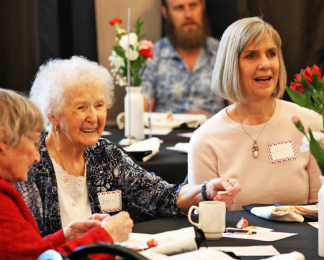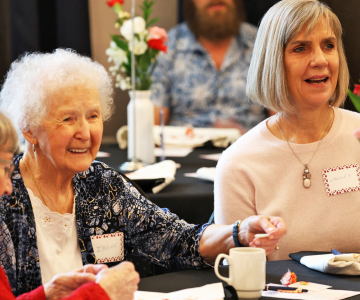It’s Valentine’s Day and Cupid’s arrow will strike far and wide. So let’s take advantage of this love-themed month to debunk a few myths about sex and older adults.
Sexual feelings do not disappear as you age
There are many taboos around sex and older adults. One such myth is that older people should not, cannot, or would not want to have sex.
“I typically get lots of questions about sex from clients at my clinics,” says Mary Kjorven, a nurse specialist in gerontology and nurse continence advisor at Interior Health. “Many older adults find it difficult to talk about sex because they feel there is a stigma about having sex at an older age. Their families, who might prefer to think of mom or dad as asexual, often perpetuate this belief. But sex and sexuality is really important to quality of life as you get older.”
Sexual experiences and how we express sexuality changes.
“As with all stages of life, personal relationships, experiencing joy in life and being present in the moment are very important to older adults,” says Shannon Paul-Jost, a clinical nurse specialist in gerontology. “Sex is a way to affirm these feelings. As people age, the frequency or ability to perform sex may modestly decline, due to physical abilities such as erectile dysfunction or vaginal dryness; however, the majority of older adults are enthusiastic about sex and intimacy.”
When Frank and Kathy’s kids left home, the couple discovered a whole new intimacy in their relationship – a side that had been somewhat restricted when teenagers were wandering the house at night.
“People assume older adults don’t have sexual desires. That’s just not true. In fact, it’s essential to revive or continue physical intimacy in our so-called golden years,” says Kathy, with a wink at her husband.
Illness, medication and health conditions can play a role in changing life in the bedroom.
A person’s health, as opposed to their age, can affect sexual ability and experience.
Poor health or chronic health conditions, such as heart disease or arthritis, make sex and intimacy more challenging. Certain surgeries and many medications, such as blood pressure medications, antihistamines, antidepressants and acid-blocking drugs, can also affect sexual function.
“Many older people feel embarrassed about asking their health-care provider about sex,” says Shannon. “They might feel unsure about the reaction to their questions, or worry there isn’t enough time in their appointment.”
While certain health conditions can affect desire and sexual ability, many people still want and need intimacy, and continue to have sexual desires as they grow older. “Often all that’s required is a little more creativity,” says Shannon. “Minor adjustments, such as taking more time, trying a different position or using props may be required to ensure sexual experiences continue to be fulfilling and satisfying.”
”Our decision to honour and protect our sex life is one reason we have such a close relationship even in our 70s,” says Kathy.














